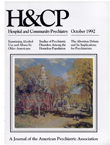Privilege and Discharge Decisions for Psychiatric Inpatients With Dysphagia
Abstract
Psychiatric patients have an increased risk for choking compared with the general population because of risk factors such as medication side effects and food gorging. A state hospital program for managing patients with dysphagia, or difficulty swallowing, includes interventions such as modified diets, mealtime monitoring, and adjusting psychotropic medications. Clinicians may find it difficult to make decisions about privileges and placement for dysphagic patients who do not comply with dietary modyfications in unsupervised settings. For many such patients, close supervision and even placement on a locked ward may seem necessary. The authors recommend a risk-benefit approach: dinicians must balance the safety afforded by restrictions against the benefits of increased privileges or placement in a less restrictive setting. Quality of he and patients' preferences must also be considered.
Access content
To read the fulltext, please use one of the options below to sign in or purchase access.- Personal login
- Institutional Login
- Sign in via OpenAthens
- Register for access
-
Please login/register if you wish to pair your device and check access availability.
Not a subscriber?
PsychiatryOnline subscription options offer access to the DSM-5 library, books, journals, CME, and patient resources. This all-in-one virtual library provides psychiatrists and mental health professionals with key resources for diagnosis, treatment, research, and professional development.
Need more help? PsychiatryOnline Customer Service may be reached by emailing [email protected] or by calling 800-368-5777 (in the U.S.) or 703-907-7322 (outside the U.S.).



